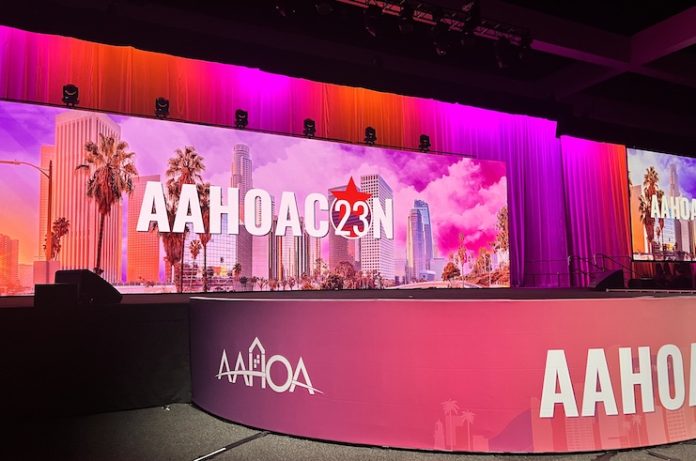AAHOACON 23 brought hotel owners, vendors, and executives under one roof to note the industry’s strides, potential pitfalls for the coming year, and strategies to face challenges head-on. LODGING saw first-hand how the over 8,000 attendees showed up to the Los Angeles Convention Center in droves to attend general sessions, the tradeshow floor, and additional events.
During one of the general sessions, Anthony Melchiorri led a panel discussion with leaders from five hotel brands concerning mitigating risks from disruptors and challenges from labor shortages, as well as shedding light on underrepresented communities in the industry.
It’s no secret that hospitality has been slow to embrace newer technologies, but there are still a variety of interrupters affecting the hotel business. For example, artificial intelligence (AI) chatbot ChatGPT is becoming more prominent in every industry in the United States, not just hospitality; Red Roof CEO George Limbert likened technology such as ChatGPT to “the calculator,” saying that people were reluctant to adopt that technology, too. However, he mentioned the area of the hospitality business where AI writing software might become prevalent is in customer reviews. “I think customer reviews will start to be written through ChatGPT,” he said. “It will be very difficult for us moving forward to try to decipher what review was real and what review wasn’t. Now, we already have that problem today…it’s going to enhance it even more. It’s going to present some challenges.”
AI software and other technology disrupters could present further issues to an industry that is heavily people focused. Delivering experiences to hotel guests through an agent is at the core of hospitality. President and CEO of BWH Hotel Group Larry Cuculic noted the industry should be “careful because we are in the people business.” People can get easily frustrated, for example, when they call and can’t get a live agent on the phone and deal with an AI chatbot. Specifically, Cuculic pressed that hoteliers should be wary of using AI writing software such as ChatGPT “because it’s not your chosen words. Everyone has a personality, and everyone writes in a particular frame of mind and in their own way of expressing themselves…Also, consider that the words you use have consequences.”
Another hospitality disruptor is alternate lodging accommodations such as short-term rentals. The big short-term rental brands have been popular for a while now and have been gaining popularity in the past few years. Keith Pierce, executive vice president of franchise development for Sonesta, mentioned the performance of some alternate lodging accommodations has grown, but “when you think of our performance as an industry over the last three years, most of it has been in rate, not much in occupancy. As we really have to reconcile the fact that there are alternative opportunities out there and our guests are paying more and we’re delivering less. And sooner or later, that’s going to come for a day of reckoning for us. If there are good alternatives in Airbnb, they’re going to continue to steal market share for us.”
And over the past three years, much has changed and continues down an evolving path for the industry. Wyndham CEO Geoff Ballotti noted that throughout the COVID-19 pandemic, what permanently changed for his team was the realization that hot breakfast at some Wyndham brands are no longer “a driver of quality or for your average daily rate.” Some brand standards—such as the hot breakfasts Ballotti specified—won’t need to be brought back following the pandemic because guests no longer have a need for those specific items. Ballotti added, “There are a lot of standards we haven’t had to go back to that I think is surprising.”
G6 Hospitality President and Interim CEO Julie Arrowsmith noted that many services, such as daily housekeeping even for full-service properties, are now unnecessary. However, what has stuck with her following the pandemic is “that people realize ‘I can travel for work and then extend and make a longer trip of it, still get some work done remotely.’ And that’s benefited all of us because that means they’re staying at a hotel much longer than before.” Bleisure has become—and remained—a popular travel trend, and one that the panel expects to continue for a while onward.
The panelists also mentioned that inbound international travel to the United States remains an issue and hasn’t come back strong due to impeding regulations although the industry continues to perform relatively well. That, coupled with the ongoing labor shortage, continues to impact the industry’s performance. In response, Arrowsmith noted that “the fundamentals of the industry are still rock solid,” and U.S. hospitality remains resilient throughout economic cycles for long-term growth. Ballotti added that those within the industry should be doing all they can—including implementing and embracing technology and new programs—to retain talent and keep employees satisfied in their work.
All five brands represented on the panel continue to highlight and support underrepresented communities in hotel ownership, including women and Black hoteliers. Each agreed that backing new hoteliers on their ownership journeys is important to fostering a welcoming environment that supports the growth of local communities, respective brands and teams, and the industry as a whole.










